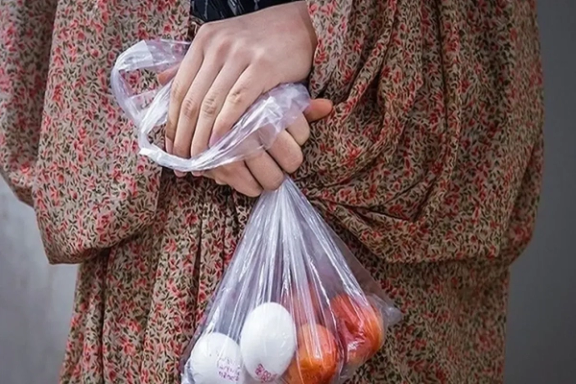Inflation-stricken Iranians voice anger over soaring costs

Iranians have expressed anguish and exhaustion and detailed their daily struggle to afford basic goods amid soaring inflation in messages submitted to Iran International.

Iranians have expressed anguish and exhaustion and detailed their daily struggle to afford basic goods amid soaring inflation in messages submitted to Iran International.
A stream of voice messages and videos sent in from across the country to Iran International's submissions line points to a population grappling with collapsing purchasing power and authorities they see as out of touch with their plight.
The average monthly salary in Iran is around 150 to 200 million rials—equivalent to approximately $200-$250. But for residents in Tehran, especially those with families, this amount barely covers essentials.
One video showed a family’s lunch—just potatoes, yogurt and bread—accompanied by a bitter message voiced by the person filming: “May God curse you."
“Two packed small cakes and two juices cost 1,000,000 rials ($1.2),” said one person by audio message. “How long must we live like this?”
From grocery items to medical care, costs have surged dramatically. A 10 kg bag of Pakistani rice now sells for 9,800,000 rials ($11.80), while apples and pears fetch up to 7,000,000 rials/kg ($8.43)
Others described medical burdens. A pensioner, aged 70, said his income was just 38,000,000 rials (around $45.8) a month. “Half of that goes to medication,” he said. In another message, a military veteran said he had to pay out of pocket for cold medicine. “At my age, this is shameful,” he added.
Multiple complaints targeted the government's National Housing Plan. One registrant said she borrowed 1,500,000,000 rials (around $1,800) for a housing deposit but never received the promised loan. “Why aren’t you giving people their loans, President Pezeshkian?” she asked.
Others addressed Iran’s leadership more broadly. “You say you’ll destroy America,” one voice said, “but people are paying 16,500,000 rials ($20) just to buy soy and beans.”
Another pointed to baby formula: two subsidized cans plus a painkiller cost over 3,400,000 rials ($4.10), with unsubsidized prices higher. “So what’s the point of subsidies?”
Several messages referenced US President Donald Trump’s recent remarks during his Middle East tour, calling Iranian leaders “thieves.” One man said, “If you’re not thieves, why are people bent over in garbage bins?”
The sharp rise in prices for basic goods such as the cheapest type of bread called lavash—up from 65,00 rials to 13,250 in under a year (~$0.008 to $0.016)—has left many Iranians how their static incomes can ever catch up to soaring costs. “Who gets a raise that often?” one asked.
The voices together point to a society under strain with many seeing no financial future in the status quo.